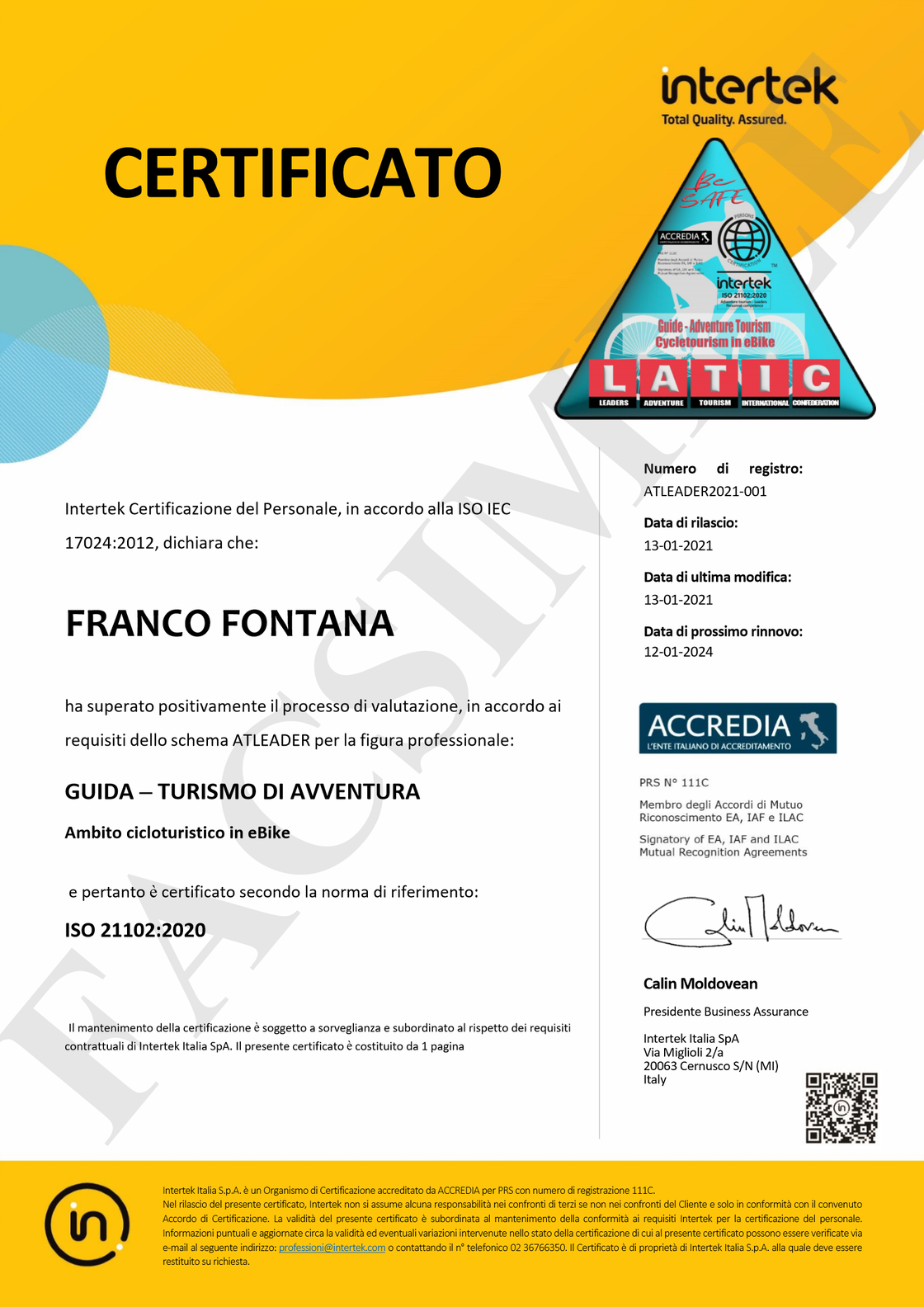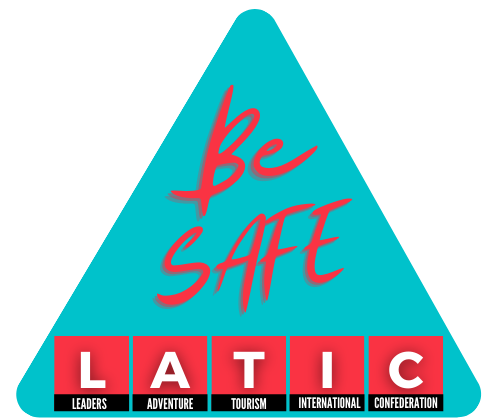certify
CERTIFICATION OF ADVENTURE TOURISM GUIDES BY SPECIFIC AREA
Certification is a conformity assessment system structured on the basis of rules defined by ISO IEC 17024, which defines the rules of certification bodies for people. A Certification Body operating in accordance with Law 4:2013 must be accredited by Accredia (the Italian single accreditation body) which guarantees that the Certification Body is adequate to certify adventure tourism guides according to ISO 21102. Certification consists of an examination based on the knowledge and skills defined within ISO 21102. Certifying a professional does not mean certifying skills, in Italy and in Europe it is the task of the state to certify them.
The certification body certifies a person, a professional, and then verifies whether the candidate complies with a regulatory document, in this case ISO 21102. Since this is a system for confirming a professionalism, the certification body, before admitting a person to the examination, must verify that he or she meets the requirements to participate. Since the certification body must operate according to the principles of independence and impartiality, it may not provide training or consultancy in the field in which it certifies; examiners, for example, may not have been teachers of candidates in previous training activities.
Examiners tend to be 'peers' qualified as examiners, i.e. they are professionals working in the specific field, who are indisputably recognised as experts (e.g. speakers of the standard or persons already certified) who verify whether the candidate falls within the scope of knowledge and skills defined in the standard. The examiner's objective is not to check how much a candidate knows but whether he or she is a professional capable of operating as defined in ISO 21102; this is why an analysis of the candidate's CV and experience is also part of the assessment process.
WHY CERTIFY
Find out what benefits certification with LATIC brings you
WHO CAN CERTIFY
Find out what the requirements for certification are
CERTIFICATION EXAMINATIONS
Find out what the LATIC certification exam consists of
Certification costs
Discover the certification costs and opportunities LATIC offers you
WHY CERTIFY, WHAT ADVANTAGES?
Lhe certification is an instrument of confirmation of a professionalism. The system of access to this type of profession is, in most cases, free, so certification is not a system of access to the world of work.
- Full compliance with Law 4:2013 professions not organised in registers and roles (where applicable)
- System to declare one's professionalism in an independent, non-self-referential manner
- Registration in the only public register recognised by Law 4, the Accredia register
- Risk reduction tool for the market and all relevant stakeholders through informed choice
- Element of possible indemnity with respect to the principle of 'culpa in eligendo' (Legislative Decree 231) for the employer, his organisation, principal or client
- Distinctive and characterising element on the market and for the market
- Possibility of participating in public tenders or private competitions where specific certifications are required
- Improvement of work perception also in terms of marketing persona, Personal Branding
- Ego, principle of self-esteem, valorisation of one's own personality
WHO CAN BE CERTIFIED, REQUIREMENTS FOR CERTIFICATION
ISO 21102 is a general standard for all guides working in adventure tourism and specific knowledge, skills and even technical competences are required for each sector or area of adventure tourism.
The model identified is to enhance the experience of each guide by ensuring professionalism, the requirement of ISO 21102 is to demonstrate the competences indicated in point 6 of ISO 21102.
It should be noted that certification is not a system of access to the world of work but is a conformity assessment tool to confirm an acquired professionalism, therefore only those who are already professionals who meet the learning requirements defined below can be certified.
The entry requirements for the certification examination are identified as 3 macro areas:
Formal learning: STUDENT TITLE
For free professions, at least an EQF4 high school diploma is required, in the case of reserved professions, e.g. Alpine Guide, a certificate from the professionalisation course.
Non-formal learning: TRAINING, SPECIALISATION AND UPDATING COSTS
Approximately at least 42 hours of theoretical and practical training related to point 6 of ISO 21102.
Informal learning: EXPERIENCE IN THE SPECIFIC ROLE
At least one year of proven experience in the role and in the specific field
HOW TO CERTIFY
Certification requires:
- Fill in the certification application
- Provide copy of identity document, Curriculum Vitae dated and signed in accordance with GDPR and Legislative Decree 445
- Certificate of occupation reservation, such as for Alpine Guides
- Certification of the association(s) for the identification of specific areas
- Course certificates proving possession of the required training credits
AREAS OF CERTIFICATION
The following is a non-exhaustive but illustrative list of the different areas that may be included in the certificate:
| Italian | English |
| Environmental hiking | Specific field Environmental hiking |
| Canyoning/canyoning | Specific field canyoning |
| Cycle tourism | Specific field cycletourism |
| Bicycle touring by eBike | Specific field cycletourism in eBike |
| River area | Specific field riverine |
| Equestrian environment | Specific field Environmental horse riding |
| Rafting | Specific field rafting |
| Nautical camping | Specific field nautical camping |
| Scope off-road tourism Car/truck | Specific field (car/truck) |
| Scope off-road tourism Motorcycle/Quad | Specific off-road field (motorbike/quad) |
| *Mountain guide U.I.A.G.M. | *Specific field U.I.A.G.M. |
| *Ambit Aspiring Mountain Guide | * Specific field aspiring mountain guide |
| *Middle mountain guide U.I.M.L.A. | *Specific field I.M.L. - U.I.M.L.A. |
| *U.I.M.L.A. Volcanological Guide | *Specific field I.M.L. Volcanic U.I.M.L.A. |
| *Naturalistic hiking guide (AO) | *Specific field nature hiking |
| Area adventure parks/acrobatic courses | Specific field Adventure park/Ropes courses/zip line |
| Camping | Specific field Camping |
| Area Caravan&Camper | Specific field Caravanning |
| Fishing | Specific field Angling |
*regulated profession so only those who are already authorised can certify themselves in this area
CERTIFICATION EXAMINATIONS
The examination for certification consists of two parts:
- Verification of requirements and curriculum vitae and the specific areas for which certification is sought
The candidate must submit a duly completed application for certification to the certification body, also indicating the specific areas in which it operates and in respect of which it will apply for certification. The application must therefore be accompanied by a detailed and complete CV, dated, signed and with specific indication of the privacy disclaimer pursuant to the GDPR and declaration pursuant to Art. 46&76 of Legislative Decree 445 declaring that what is declared is true. Certificates of training credits, i.e. of courses conducted in the last 24 months with clear indication of the hours and type of course(s) must also be attached. It will also be necessary to provide a declaration from the Association to which the applicant belongs or from the register (for Alpine Guides, registration in the register is sufficient) in respect of specific competence in one or more of the specific areas required.
- Certification examination based on two tests: a written test of 60 multiple-choice questions of which only one is true, and if you pass with a score of 70 or above % you enter the oral test centred on the verification of your CV and experience and some elements of skills
If you pass the examination, you are provided with a certificate in PDF format with the areas of competence and your name is entered in Accredia's public register, which is the only one valid under Law 4:2013-


CERTIFICATION COSTS
The costs for the certification of persons are defined by the certification body. The Confederation has identified the only accredited Certification Body as a partner and has negotiated a rate agreement for its members and associates that grants a discount of 50 % of the certification costs. This fee schedule is public and can be downloaded from this site or directly from the Certification Body's website.
The cost of certification consists of an initial certification cost divided into two parts, one relating to the examination eligibility check and one examination cost. Once certification has been obtained, there is then an annual maintenance cost based on continued professional practice, professional updating and the proper handling or absence of complaints from clients.
